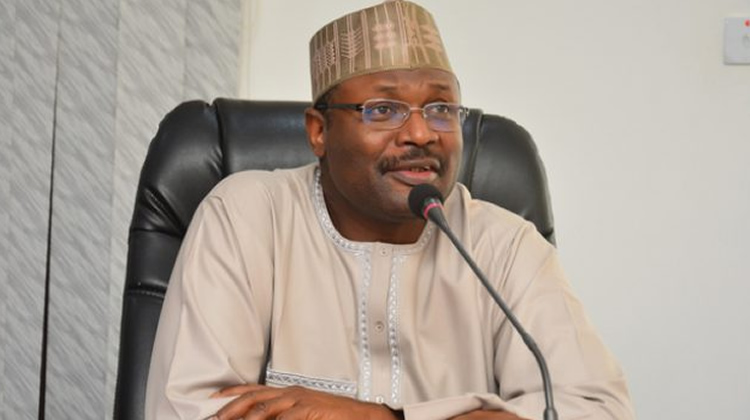POLITICS

WHEN FAKE PATRIOTS PEDDLE CONSPIRACY THEORIES AGAINST INEC
Relentless and often hypocritical attacks on the Independent National Electoral Commission (INEC) and its Chairman, Professor Mahmood Yakubu, have become a favorite pastime for self-styled patriots—individuals who parade themselves as defenders of democracy but are, in fact, driven by selfish ambition. Their goal is clear: discredit INEC to force their way into national relevance. Their method is predictable: smear the institution, question its integrity, and create chaos. Fortunately, they are failing.
A recent interview granted by Mr. Rotimi Amaechi—former Governor of Rivers State, Minister of Transportation, and Director-General of Muhammadu Buhari’s 2019 Presidential Campaign—was particularly amusing. Amaechi claimed that the All Progressives Congress (APC) wouldn’t have won the 2015 presidential election if Prof. Yakubu had been the INEC Chairman at the time.
But who conducted the 2019 election where Buhari won reelection? It was the same Prof. Yakubu. Has Amaechi forgotten that he was an integral part of that campaign, serving as its Director-General? Then, there were no complaints about the credibility of INEC or its leadership. In fact, at a press conference on March 5, 2019, Amaechi mocked the losers, saying: “It is only those who fail elections that gather for meetings, while the winners just gather to pop champagne and drink to their victory.”
Fast forward to 2023—Amaechi contests the APC presidential primary and loses. INEC had no role in the party primaries. Yet, Amaechi emerged a vocal critic of the Commission. Why the sudden change of tune? The answer is obvious: sour grapes.
Supporters of the Labour Party (LP) and Peoples Democratic Party (PDP) are not left out. Many still cling to the illusion that they won the 2023 presidential election, despite clear judicial verdicts to the contrary. They have weaponized social media, not only to attack INEC but also to cast aspersions on the judiciary, even accusing Supreme Court Justices of compromise. They have tried every trick to tarnish Prof. Yakubu’s image. But to his credit, he has maintained a dignified silence, refusing to be dragged into their circus.
Were the 2023 elections perfect? No. But perfection is a myth, even in advanced democracies. The United States—the same country whose presidential system Nigeria emulated—still bears the scars of its controversial 2020 election and the Capitol Hill insurrection it sparked.
When viewed objectively, INEC’s performance since 2015 under Prof. Yakubu shows remarkable progress. The 2023 general elections—presidential, parliamentary, gubernatorial, and state assembly—met the standard of substantial compliance. They were free, fair, and credible by global standards.
Here’s why:
Political Diversity: For the first time since 1999, four political parties won governorship elections. Seven parties secured Senate seats, eight won House of Representatives seats, and nine made it into state assemblies. Such diversity is unprecedented and disproves claims of systemic rigging.
Technological Innovation: INEC introduced the Bimodal Voter Accreditation System (BVAS), replacing the compromised Smart Card Reader. This move ended proxy voting and disrupted rigging plans, as only verified voters could cast their votes. The result? Politicians resorted to open vote buying because warehoused PVCs became useless.
Voter Access Expansion: The number of polling units grew from 119,974 to 176,846—the first expansion in 25 years. INEC also launched an online registration portal, which helped register 9.5 million new voters between 2021 and 2022, raising the voter register to over 93 million.
COVID-19 Resilience: Amid a global pandemic, INEC became the first African Electoral Management Body (EMB) to publish a policy on conducting elections in the COVID-19 context. This allowed it to safely hold elections when the world was on lockdown.
Electoral Reform: INEC championed the enactment of the Electoral Act 2022, which ensured timely funding and granted the Commission power to review wrongly declared results—enhancing fairness and autonomy.
Transparency through IReV: The INEC Result Viewing Portal (IReV) allowed real-time access to polling unit results. Although there was a technical glitch during the presidential election, it was quickly resolved. Importantly, IReV isn’t a collation tool, but it empowered citizens with greater election visibility than ever before.
Inclusivity Milestones: Recognizing the needs of marginalized groups, INEC created a Department of Gender and Inclusivity. From magnifying glasses for persons with albinism to braille guides for the visually impaired, the Commission has taken meaningful steps toward inclusive elections.
These are not minor achievements. They represent a systematic overhaul of Nigeria’s electoral process. Yet, professional naysayers—driven by bitterness and self-interest—continue to manufacture lies, spread conspiracy theories, and denigrate democratic institutions.
It’s a shame. But thankfully, their efforts are collapsing under the weight of truth and progress.
"This represents a significant development in our ongoing coverage of current events."— Editorial Board









